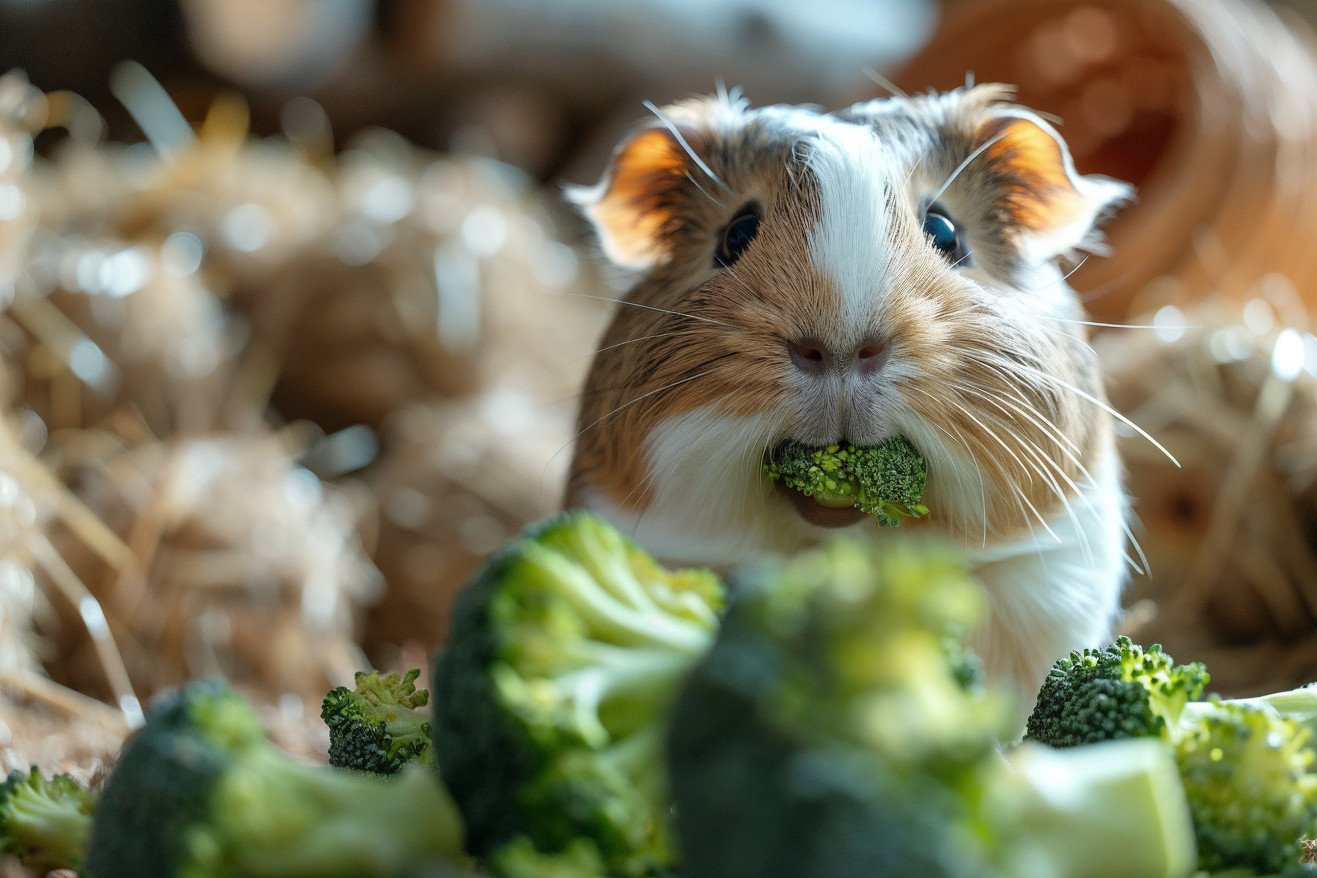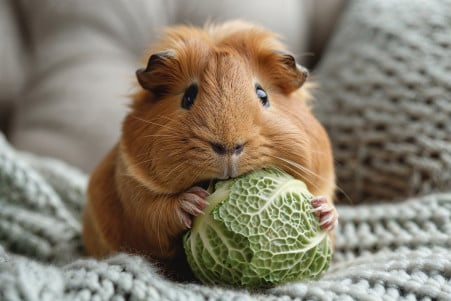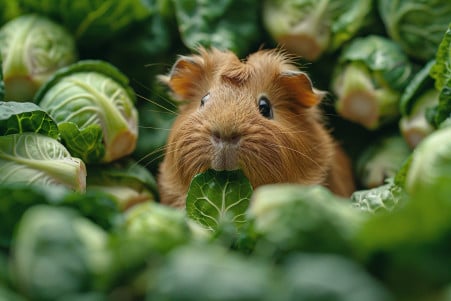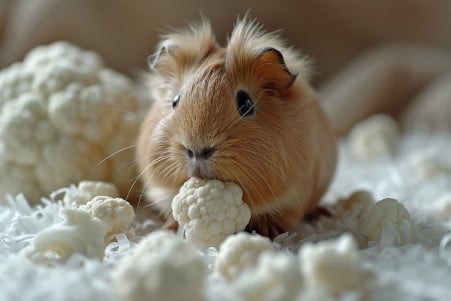Can Guinea Pigs Have Broccoli? Nutritional Benefits and Guidelines
14 February 2024 • Updated 12 February 2024

Broccoli is packed with nutrition, but can guinea pigs eat it? Yes, guinea pigs can eat broccoli as a source of vitamin C, but it should be fed in small amounts to avoid digestive upset and gas. All parts of the broccoli, including the stems and leaves, are fine to feed, but like with any new food, it’s best to introduce them slowly.
This in-depth article will take a closer look at the most recent veterinary research and nutritional information to shed light on how eating broccoli can impact a guinea pig’s health. It will also consider advice from exotic animal veterinarians on how to make sure your guinea pig’s diet is as well-rounded as possible.
With an eye toward the importance of feeding guinea pigs a varied diet, the article will explore the best ways to feed them vegetables like broccoli to make sure they stay as healthy as possible.
Can guinea pigs have broccoli?
Broccoli: A Nutritional Powerhouse for Guinea Pigs
Broccoli is full of important nutrients, including vitamins, minerals, and fiber, that can be very helpful for guinea pigs. In fact, one cup of broccoli contains the vitamin C that guinea pigs need since they can’t make it themselves.
In fact, WebMD says that broccoli has about the same amount of vitamin C as an orange, which is important because vitamin C is an antioxidant that helps the body fight off free radicals and heal.
In addition to helping with digestion, the fiber in broccoli is important for guinea pigs, and the minerals in broccoli, including calcium, phosphorous, and potassium, are important for guinea pigs’ overall health. In fact, Healthline says that broccoli is a good source of vitamin K, iron, and other important nutrients.
Broccoli also contains sulforaphane, a compound that Medical News Today says may help the immune system and reduce inflammation. However, it’s important to remember that guinea pigs can’t eat too much broccoli because it contains goitrogens and is high in calcium.
When it comes to portion size, a few small florets or a piece of the stalk a couple of times a week is best to make sure that guinea pigs get the most out of the vegetable without upsetting their stomachs. This will help ensure that they get the most out of the vegetable.
Step-By-Step Guide: How to Feed Broccoli to Your Guinea Pig
To make sure your guinea pig has a positive experience with broccoli, it’s important to introduce it into their diet slowly. Start with very small amounts—just a few small pieces or a single floret—and watch your guinea pig for the next 24 hours to see how they react.
This way, you can make sure they don’t experience any negative side effects, such as bloating or changes in their stool, which can be a sign that their digestive system is having trouble adjusting to the new food.
To make sure your guinea pig gets a balanced diet and doesn’t experience any digestive issues, limit the number of times you feed them broccoli to a few times a week. As the Southern California Guinea Pig Rescue notes, it’s best to avoid giving your guinea pig broccoli too often because cruciferous vegetables can cause gas and bloating.
To make sure your guinea pig gets a well-rounded diet, you can also feed them broccoli with leafy greens like romaine lettuce, or vitamin C–rich bell peppers, which have lower calcium levels. This way, you can make sure your guinea pig gets the nutrients they need while reducing the risk of them getting too much of certain nutrients.
Keep your broccoli in a cool, dry place and wash it thoroughly before you give it to your guinea pig. Cut the broccoli into small, bite-sized pieces to make it easier for your guinea pig to eat.
And remember, fresh vegetables are always best for your guinea pig, so make sure you prepare the broccoli and any other vegetables you feed them right before you give it to them to make sure they get the most nutrients from it.
If you follow these steps, you can successfully feed your guinea pig broccoli, which can help support their health and well-being. With a little vigilance and a variety of other healthy vegetables in their diet, you can make sure you’re doing everything you can to help your guinea pig thrive.
Through the Gut: Guinea Pigs and Their Vegetable-Rich Diet
Knowing how a guinea pig’s digestive system works is important for anyone who keeps them as a pet. Zooplus Magazine explains that guinea pigs have a special digestive system that is made for a diet that is high in fiber. Their teeth grow continuously, so they need a diet that is high in fiber to help keep them filed down, and their stomach and intestines are set up to digest fibrous plant materials.
This is where vegetables like broccoli come in. They are full of fiber, which is exactly what guinea pigs need.
However, some vegetables can cause gas and other issues because they have compounds in them that can be hard for guinea pigs to digest in large amounts. Winter Park Veterinary Hospital explains that if guinea pigs are introduced to a variety of foods when they are young, they are more likely to be able to digest them, which can help prevent gastrointestinal issues.
Diarrhea and gastrointestinal stasis are two of the most common digestive issues that guinea pigs face, and both can be caused by an unbalanced diet. RSPCA says that a diet that includes fresh, leafy greens like broccoli is important not only for making sure that guinea pigs get enough vitamin C, but also for making sure that they have a healthy digestive system.
Because of this, veterinarians recommend that new vegetables be introduced to guinea pigs slowly and in small amounts so that their digestive system can get used to them and they can avoid the health issues that can come with a sudden change in diet.
By being careful about how you introduce vegetables to your guinea pig, you can make sure that they get the nutrients that they need while minimizing the risks that can come with overeating.
The Balancing Act: Calcium and the Dangers of Overfeeding Broccoli
While broccoli can be a healthy part of a guinea pig’s diet, overfeeding can cause health problems. One of the most serious is the development of bladder stones, which can be caused by the high levels of calcium and oxalate in broccoli. These substances can build up and crystallize in a guinea pig’s urinary tract, leading to pain and potential medical complications.
As noted by PetMD, calcium is an important nutrient for guinea pigs, especially when it comes to bone growth and lactation. However, an overabundance of calcium can lead to an imbalance, which is why it’s important to make sure your guinea pig’s diet is well-regulated. A study in PubMed delves into the relationship between diet and bone density and mineral metabolism, showing that the connection between dietary calcium and health is complicated.
To make sure your guinea pig gets the right amount of calcium, make sure to feed them a variety of vegetables and only give them small amounts of high-calcium foods like broccoli. Keep an eye out for signs of overfeeding, including changes in the frequency or consistency of your guinea pig’s urine, as well as a lack of energy or appetite, as these can be signs of too much calcium.
If you think your guinea pig has been overfed, work with a vet to adjust their diet as needed. By getting personalized diet recommendations, you can make sure your guinea pig doesn’t experience any future health problems and stays as healthy as possible.
How to Make Sure Your Guinea Pig Has a Healthy Diet: More Than Just Broccoli
In order to help your guinea pig live a long and healthy life, it’s important to make sure that you’re feeding them a variety of vegetables, including broccoli, in a way that is safe and healthy. A-Z Animals notes that broccoli should be fed in moderation, no more than a couple of times a week and in small amounts, to avoid digestive problems and to encourage a varied diet.
After all, variety is important for guinea pigs too. By rotating the vegetables that you feed your pet, you can make sure that they’re getting a range of nutrients and that they don’t get bored with their food.
In addition to broccoli, other safe vegetables for guinea pigs include bell peppers, romaine lettuce, and cucumber, all of which can be fed to guinea pigs daily, according to GuineaPiggles. Meanwhile, parsley, kale, and carrots are other good options, although the latter should be fed in moderation to avoid problems like bloat that can be caused by cruciferous vegetables.
A healthy diet for your guinea pig will include broccoli, but it won’t rely on broccoli alone. The RSPCA recommends that fresh hay and grass should make up the majority of a guinea pig’s diet, with a small, regular serving of vegetables providing the nutrients that they need.
Always monitor your guinea pig for any changes in their health or behavior when you introduce new foods so that you can quickly address any negative reactions and make sure that your pet stays healthy.
Conclusion: Guinea Pigs and Broccoli
In conclusion, it’s clear that while broccoli can offer some important nutritional benefits to guinea pigs, it’s best to do so in moderation. Thanks to its vitamin C and fiber content, broccoli can help support the immune system and digestive health of our furry friends.
However, it’s also important to take the warnings about overfeeding due to broccoli’s calcium and oxalate content seriously, as this can lead to health problems such as bladder stones.
The discussion of how to incorporate broccoli into a guinea pig’s diet in a healthy way underscores the importance of introducing new foods slowly and offering a wide range of options. By pairing broccoli with a variety of other vegetables, guinea pigs can enjoy a well-rounded diet that’s packed with essential nutrients. Meanwhile, paying attention to how your pet responds to new foods can help you be proactive about their health.
It’s important to keep learning about guinea pig nutrition and to work with a vet to get personalized advice about your pet’s diet. After all, part of being a responsible pet owner is making sure that you’re meeting your pet’s dietary needs so that they can be as healthy and happy as possible.
In the end, the love and care we give our pets can make a big difference in their lives.


